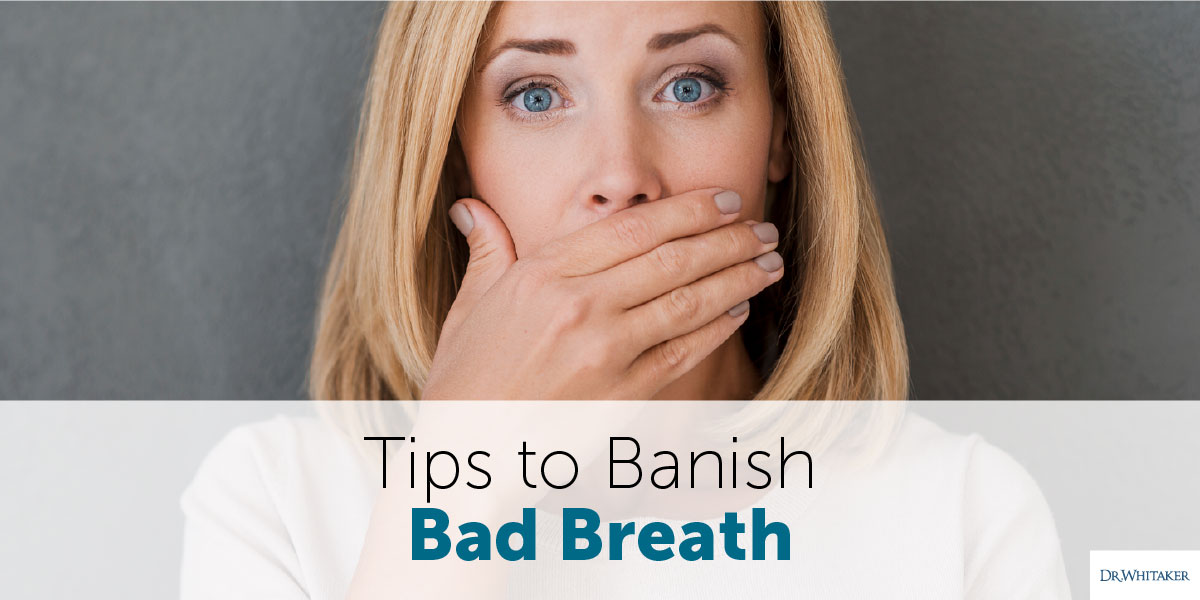
Garlic then hath power to save from death
Bear with it though it maketh unsavory breath,
And scorn not garlic like some that think
It only maketh men wink and drink and stink.
— The Englishman’s Doctor, by Sir John Harrington, 1609
As this verse laments, the major drawback to eating garlic—or other strong-smelling foods like onions or tuna fish—is bad breath. Usually, the smell is transient and can be masked with a good brushing or a mint or stick of gum.
Chronic bad breath or halitosis, on the other hand, is another story. Billions of dollars are spent in this country every year on products promising to get rid of this condition. Yet most of these products, which include alcohol-, peroxide- and baking soda-based mouthwashes, toothpastes and sprays, mask the odor at best and in some cases actually make the problem worse.
But don’t worry. If you’re one of the 40 million Americans who suffer with halitosis, I’ve got a few tips for you that will help you banish bad breath.
Tip #1: Maintain Scrupulous Oral Hygiene
It should go without saying that daily brushing and flossing along with regular professional cleanings and dental check-ups go a long way toward preventing bad breath. These measures reduce the buildup of bacteria that emit volatile sulfur compounds, which are the primary cause of the foul smell of halitosis.
Unfortunately, studies show that only about 70 percent of Americans brush their teeth the recommended minimum two times per day and just 41 percent floss on a daily basis. Furthermore, according to a Gallup poll, in 2013 more than one-third of US adults didn’t bother visiting their dentist at all.
Banishing bad breath starts with brushing your teeth at least twice a day for two minutes each time and flossing daily as well. Research suggests that “water flossing” (Waterpiks) may be even more effective than traditional flossing because most people don’t use dental floss correctly or regularly. I also recommend seeing your dental hygienist every six to 12 months for deeper cleanings to ensure fresher breath and tip-top oral health.
Tip #2: Try Tongue Scraping
Most folks brush their teeth pretty regularly, but how many of you actually clean your tongue? You should, because tongues are particularly susceptible to bacteria that cause bad breath. Of course, you can clean your tongue with your toothbrush, but I also recommend you consider tongue scraping, which has long been a routine hygiene practice in many cultures, especially in Africa, India, and the Middle East.
Tongue scraping removes the coating of bacteria-containing plaque, thus sweetening the breath and lessening the overall bacteria load that contributes to gum disease and tooth decay. Look for tongue scrapers—long, thin, curved pieces of metal or plastic—online or in your health food or drug store, and use as directed.
Tip #3: Use Alcohol-Free Mouthwash
Do you regularly use mouthwash to freshen your breath? Then you’d better reconsider. Most mouthwashes contain alcohol, and studies have linked these popular products with an increased risk of oral cancer. When alcohol is swished around the mouth, it not only allows carcinogens easier entrance into the oral mucosa, but one of its byproducts, acetaldehyde, is itself carcinogenic. Alcohol-containing mouthwashes also eradicate the good bacteria on the back of the tongue that play a role in the production of nitric oxide, which is essential for blood vessel dilation and cardiovascular health.
Experts agree that a good brushing and flossing are more important than using mouthwash, but if you like the fresh feeling and sweet breath that mouthwash provides, I encourage you to switch to an alcohol-free product, such as Tooth and Gums Tonic from the Dental Herb Company.
Tip #4: Consider “Oil Pulling”
“Oil pulling” is an ancient Ayurvedic medicine practice that is purported to have multiple health benefits including improving bad breath. You simply put a tablespoon of coconut oil (extra-virgin preferred) in your mouth and swish it around, much like you would mouthwash, for 15 minutes or longer before spitting it out.
In addition to promoting oral health and freshening the breath by “pulling out” bacteria and plaque, oil pulling is purported to clear out sinus passages, help detox the body, and protect against all kinds of ills. I can’t personally vouch for all of these health benefits, but oil pulling does leave your mouth feeling pretty clean and likely helps get rid of bad breath too.
Tip #5: Give Probiotics a Chance
You can also fight bad breath with probiotics. When you suck on lozenges that contain Streptococcus salivarius K12, these beneficial bacteria colonize the mouth, crowding out and inhibiting the growth of odor-producing bacteria. As an added bonus, probiotic lozenges also help stave off ear, nose, and throat infections.
Tip #6: Drink Tea
Want to give bad breath the boot? Try drinking a cup of tea. Landmark studies conducted more than a decade ago found that antioxidant-rich extracts from green and black tea had the ability to kill off odor-causing bacteria. This same research demonstrated that the polyphenols tea contains prevented plaque formation and eliminated the production of acids that can lead to cavity formation. Try drinking a cup of black or green tea daily—even if it doesn’t help with bad breath, tea has so many other positive effects, it’s sure to benefit your health.
Tip #7: Rule Out Other Causes
Chronic bad breath can also be a warning sign of more serious problems. Gum or periodontal disease is an obvious culprit. But bad breath can also be due to GERD (acid reflux), postnasal drip, chronic sinusitis, throat and respiratory infections, liver and kidney disease, lactose intolerance, certain medications, and more. If your symptom persists, talk to your doctor about ruling out underlying medical disorders.
No More Embarrassing Bad Breath
Bad breath doesn’t have to be an embarrassing health problem any longer. Just follow these tips and you’ll be well on your way to fresher breath and better oral health overall.


